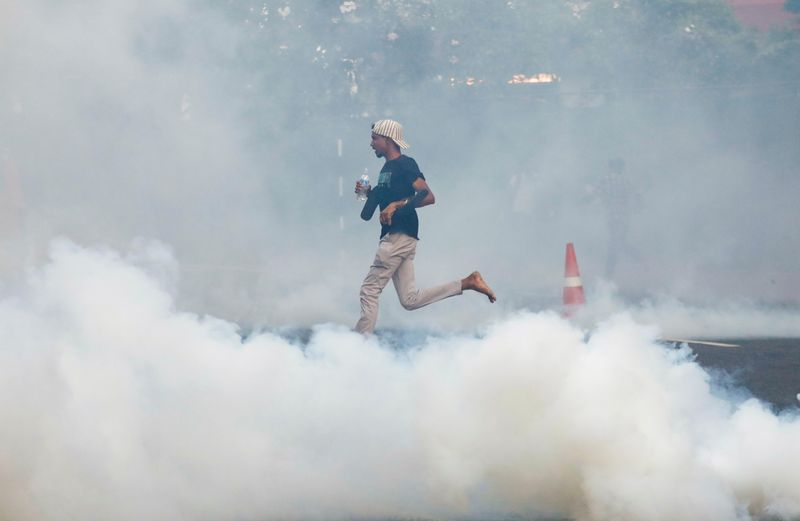By Alasdair Pal
(Reuters) - Sri Lanka's Gotabaya Rajapaksa, who oversaw a ruthless crushing of Tamil Tiger guerrillas to end a long-running civil war and went on to become president, had been due to step down on Wednesday to appease a population angry over several tumultuous months of economic and political crisis.
He chose to do so by fleeing the country.
An immigration official said Rajapaksa, his wife and two bodyguards left the country by a Sri Lankan air force plane in the early hours of Wednesday. A government source said he had gone to Male, the capital of the Maldives.
After the dramatic storming of the president's official residence by protesters on Saturday, the speaker of parliament had said in a video statement that Rajapaksa had informed him that he would step down on Wednesday.
Rajapaksa was part of one of Sri Lanka's most powerful political families in the country's post-independence history.
Unlike his elder brother Mahinda, who dominated Sri Lankan politics for nearly 20 years in stints as president and prime minister, Gotabaya did not set out for a life in government.
Instead he joined the army at the age of 21, serving for two decades and rising to the rank of lieutenant-colonel. Taking early retirement he emigrated to the United States, where he worked in information technology.
Gotabaya's entry into politics came when Mahinda became Sri Lanka's president in 2005 and tapped him as defence secretary, putting him in charge of the war against the Liberation Tigers of Tamil Eelam (LTTE), a guerrilla group that was fighting for an independent state in the north and east of the country.
After 26 years of conflict, the Tigers eventually conceded defeat in 2009 following a ferocious government offensive in which the United Nations has estimated as many as 40,000 Tamil civilians were killed in the final few months of the war alone. The government has countered that the rebels kept thousands of civilians as human shields, exacerbating the death toll.
While Gotabaya was seen as a war hero by many of the island's Sinhalese Buddhist majority, others accused him of war crimes including killings, torture and the disappearances of government critics - charges he consistently denied.
Though he stepped down in 2015 when Mahinda lost power, the Rajapaksas, perceived as tough on extremism, were able to step back into the political limelight after coordinated suicide bombings by Islamist militants that killed more than 250 on Easter Sunday, 2019.
With Mahinda barred from standing due to a two-term limit, that left Gotabaya as the obvious candidate to represent the Rajapaksa family and their Sri Lanka Podujana Party as president.
NATIONAL SECURITY PLATFORM
Gotabaya was scathing of the then-government, claiming it had dismantled a comprehensive intelligence network he had set up during the civil war.
"They did not give priority to national security," he told Reuters a week after the bombings when announcing his presidential run. "They were talking about ethnic reconciliation, then they were talking about human rights issues, they were talking about individual freedoms."
Gotabaya won the November 2019 poll by a wide margin, and promised to represent all Sri Lankans regardless of their ethnic and religious identity.
His campaign was little affected by two lawsuits in the United States that accused him of involvement of the abduction and murder of a journalist, as well as being complicit in the torture of a man belonging to the ethnic Tamil community.
He called the lawsuits baseless.
In August 2020, his party increased its majority to two-thirds in parliament, allowing for a repeal of laws limiting presidential power - including the two-term limit.
He reappointed Mahinda as prime minister and a slew of other relatives into ministerial roles. But the family's grip on power did not last long.
Hit hard by the pandemic and populist tax cuts, Sri Lanka fell into its worst economic crisis since the end of colonial rule in 1948. Shortages of essentials and rampant inflation brought thousands on to the streets in months of protests this year.

Mahinda stepped down as prime minister after a mob of his supporters attacked anti-government protesters on May 9, leaving Gotabaya an increasingly isolated figure, rarely leaving his residence as unrest intensified.
Protesters stormed Gotabaya's residence on Saturday and also set fire to the prime minister's home in Colombo. Neither were in their residences at the time. Two defence ministry sources said Rajapaksa had left the official residence on Friday ahead of the planned weekend demonstration.